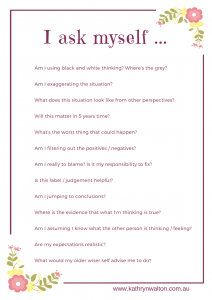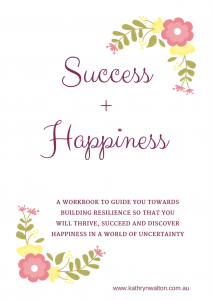
This post is all about using powerful mind-based strategies to boost your resilience and enhance your sense of wellness. In my last blog post I stepped you through how to create your own recipe for success and happiness that grows from a base of action-based strategies. Your recipe included actions that enhance physical and mental strength such as meditation, exercise, socialising, nutrition and sleep among others. Today we’re adding to your mix with powerful mind-based strategies!
 Click here to read my last blog post “Recipe for Success and Happiness: getting the mix right!”
Click here to read my last blog post “Recipe for Success and Happiness: getting the mix right!”
When you have a solid routine of action-based strategies enhancing your resilience, you’ll be ready to make effective use of mind-based strategies as well (the psychological jargon is ‘cognitive strategies’). These tend to be a little bit trickier than the action-based strategies because they deal with things we can’t see, like our thoughts, feelings and attitudes. But mind-based strategies can be incredibly powerful so they are definitely worth practising.
When you combine helpful actions with powerful mind-based strategies, you’ll create a deep sense of wellness and inner strength. You’ll be better equipped to manage stresses and will be able to bounce back more quickly when life throws those curve balls. As a result, you’ll know what it is to experience success more often and your satisfaction and happiness will soar. BUT the key point is that you need to PRACTISE them. All of them. Repeatedly. Don’t give up. New habits can take weeks to gel, so stick at it!
Mind-based Strategies
1. Keep a bagful of helpful questions handy – “I ask myself …”
- Am I using black and white thinking? Where’s the grey?

- Am I exaggerating the situation?
- What does this situation look like from other perspectives?
- Will this matter in 5 years time?
- What’s the worst thing that could happen?
- Am I filtering out the positives / negatives?
- Am I really to blame? Is it my responsibility to fix?
- Is this label / judgement helpful?
- Am I jumping to conclusions?
- Where is the evidence that what I’m thinking is true?
- Am I assuming I know what the other person is thinking / feeling?
- Are my expectations realistic?
- Am I focusing on things outside my control?
- What would my older wiser self advise me to do?
2. Work towards goals – long-term, medium-term and short-term
Break them up into little steps and focus on one little step at a time. A personal  example of mine was when I registered for “Chicks in the Sticks”, a 3 hour women’s only enduro mountain bike event. I had months to prepare myself physically and psychologically which was a good thing because I’d never been in a bike race before and was terrified at the idea! I broke my goal down into smaller goals such as joining regular group rides, developing a training plan with increasing ride lengths and levels of difficulty, and having some coaching sessions.
example of mine was when I registered for “Chicks in the Sticks”, a 3 hour women’s only enduro mountain bike event. I had months to prepare myself physically and psychologically which was a good thing because I’d never been in a bike race before and was terrified at the idea! I broke my goal down into smaller goals such as joining regular group rides, developing a training plan with increasing ride lengths and levels of difficulty, and having some coaching sessions.
3. Don’t give up when things don’t go as expected
Use a problem-solving technique to brainstorm ideas (even the crazy ones!), evaluate your options, choose one option, implement it, review how it’s going, and repeat this process as often as necessary.
4. Give yourself words of affirmation, reminders that you are ok
Many of us talk down to ourselves in critical ways, we tend to notice our shortcomings and weaknesses, but there’s a whole lot more to ourselves that needs some attention too! For example, tell yourself “You did great!”, “You are enough”, “Wow you’re getting stronger all the time!”
5. Gather a store of mantras, statements, quotes or ways of being that you intentionally choose to live by
 You can collect them from songs, poems, books and social media in addition to listening to your own inner wisdom. Write them on sticky notes, in a journal or diary, print out visual reminders to stick around your home or workplace, or even use them as screen savers and wallpapers on your electronic devices. Some examples include “Just do it”, “One drop raises the ocean”, “Keep it simple”, “Just breathe”, “Stand tall”.
You can collect them from songs, poems, books and social media in addition to listening to your own inner wisdom. Write them on sticky notes, in a journal or diary, print out visual reminders to stick around your home or workplace, or even use them as screen savers and wallpapers on your electronic devices. Some examples include “Just do it”, “One drop raises the ocean”, “Keep it simple”, “Just breathe”, “Stand tall”.
6. Get yourself a playlist of mentors and role models
They might be people you know and admire personally, or they could be people you’ve read about, or even characters from movies or books. When you find yourself feeling anxious or angry, ask yourself “What would [insert name of someone you admire] say or do in this situation?” One of the tracks on my personal playlist is a mountain bike coach I went to a couple of years ago. I sometimes hear his voice when I’m riding technical terrain on my bike “Get down low. Lower!”, and “Look up. Higher!” These words have been invaluable as I’ve learned to manage my fears about riding.
7. At any time you can call upon 5 seconds of courage
That’s all it takes to pick up the phone, make an assertive statement, click on a button or walk away from a situation. Think what YOU could do in YOUR five seconds of courage!
8. Develop a mindful approach to living
Notice more of your inner world and the subtleties of the world around you. Really get to know yourself, your patterns, thoughts, reactions. With this powerful knowledge you can then make conscious choices to do things differently, or the same. You’ll be in charge of your responses instead of the other way around.
9. Visualise how you would like things to be
Picture yourself doing something you want to achieve, or being the sort of person you’d like to be. Visualisation can be used for relaxation (eg visualise yourself  lying on the beach, your stresses trickling away into the sand beneath you) or to help you progress towards a goal (eg visualise yourself speaking in front of an audience, feeling confident, upright posture, smiling, relaxed). When I’m feeling nervous about riding my bike on a particular section of track, I stop for a few moments and picture myself riding it the way I want it to go, as if I’m watching a short video of myself successfully negotiating that section. It truly is a powerful mind-based strategy and one you can use in every area of your life.
lying on the beach, your stresses trickling away into the sand beneath you) or to help you progress towards a goal (eg visualise yourself speaking in front of an audience, feeling confident, upright posture, smiling, relaxed). When I’m feeling nervous about riding my bike on a particular section of track, I stop for a few moments and picture myself riding it the way I want it to go, as if I’m watching a short video of myself successfully negotiating that section. It truly is a powerful mind-based strategy and one you can use in every area of your life.
Free printable to keep your powerful mind-based strategies in play!
So there you have it – some really powerful mind-based strategies to throw into  the mix. And to help you keep your strategies in play, I’ve created a free printable for you. “I ask myself …” is a beautiful keepsake of the helpful questions listed above. You can download it for free from my website, ready to print and display. This will be a valuable tool to keep your powerful mind-based strategies present everyday.
the mix. And to help you keep your strategies in play, I’ve created a free printable for you. “I ask myself …” is a beautiful keepsake of the helpful questions listed above. You can download it for free from my website, ready to print and display. This will be a valuable tool to keep your powerful mind-based strategies present everyday.

Each month you’ll have access to a new FREE PRINTABLE on my website that will guide you on your journey of wellness. To make sure you don’t miss out, sign up for my email “Grounded Inspiration”. You’ll be the first to hear about my latest offers, news and inspirations. When you sign up, you’ll also have EXCLUSIVE ACCESS to a mini-workbook “Success & Happiness”, a unique guide to creating your own recipe for happiness using action-based strategies that beautifully compliments my last blog post.
 Discovering mountain biking as life’s ultimate parallel universe in her middle age, Kathryn Walton shares information and reflections in Daisy Spoke that connect, inspire and self-empower women to make healthy choices for themselves.
Discovering mountain biking as life’s ultimate parallel universe in her middle age, Kathryn Walton shares information and reflections in Daisy Spoke that connect, inspire and self-empower women to make healthy choices for themselves.
 I have an EXCITING OFFER for you!
I have an EXCITING OFFER for you!